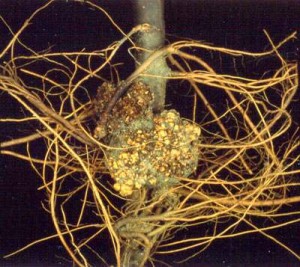I was asked if I would answer this question that appeared in a permaculture chat group. It raises some excellent questions particularly for those interested in organic growing.
"A friend of told him that a lot of the organic fruit trees available to buy are grafted onto non-organic and often genetically modified grafting stock. He knows of a nursery up in Shepparton that stocks non GM fruit tree grafts, but does anyone know of a place to buy any more locally? Would be great if people could offer any suggestions."
 There are two distinct issues:
There are two distinct issues:
- organic vs. non-organic fruit tree production
- genetic modification
They are interrelated of course, but still separate issues.
Crown Gall Treatment
The genetic modification referred to relates to a product used to treat Crown Gall.
This product, Nogall, is a GM organism and this means treated trees cannot be used for certified organic fruit production.
The development of Nogall, through its initial discovery and then later further development to overcome resistance developement can be found HERE. It is facinating reading and a case of Australian research benefitting the world.
While there is a genetic modification involved in the product it is of a minor nature and involves removing genetic code rather than the addition of something foreign to the K1026 strain of the Rhizobium rhizogenes organism that constitutes Nogall.
Without Nogall it is clear that stone fruit, raspberry production and other crops would be severely curtailed in many parts of the world.
At this time we do not treat our stock with Nogall.
Organic Nursery Production
The issue of organic fruit tree production brings other considerations into play including:
- pests and diseases that can’t be eradicated by organic means especially in a nursery monoculture,
- crop-rotation/soil-health issues particularly in decades old stool beds,
- plant nutrition in densely planted tree rows,
- legal phyto-sanitary requirements for intra- and interstate plant export, etc.
Organic certification is generally, if not always, applied to fruit production rather than tree production. The only substantial concern for growers seeking organic certification is that their trees have not been treated with Nogall, because if they have been then the trees themselves have been genetically modified and can never be considered organic. As implied above this looks to us like a case of bureaucratic overreach.
In other respects, after trees have been in their final location for up to one season, the minimum required for crop production, the impact of any prior chemical treatment would have disappeared. (Different considerations would apply to vegetable seedling production of course.)
Most, if not all, tree producers would follow some practices which would be considered non-organic in a certification sense. To my knowledge there are no growers small or large that are certified organic and I can think of none that claim to produce trees organically.
In order to make organic fruit production feasible some chemical use in tree production is probably necessary. An organic grower is unlikely to appreciate receiving stock infected or infested with a disease or insect pest or contaminated with weed propagules such as seeds or plant parts.
Wooly Aphid is a good example of a very persistent pest. Dwarfing rootstocks in the Malling series, these are the ones that start with an M: M9, M26, etc., are highly susceptible to Woolly Aphid. No matter what anyone says, you simply cannot control Woolly Aphid without some chemical use. In order to sell clean trees on M series rootstocks some chemical treatment during production is necessary.
There are other considerations. For example by growing in pots, a practice that is increasing in popularity mainly for environmental reasons (esp. in Europe and the UK), you avoid many of the soil management and phyto-sanitary challenges and therefore minimise chemical (and water) use, but you do need to use soil-less potting mixes and plastic pots, both requiring manufacturing and transport energy, and artificial fertilisers. These can be accurately applied to avoid run off, but they are clearly not 'organic', (even if they are produced by organic chemistry!)
On the other hand importing relatively large quantities of manure to either manufacture compost or directly top dress in-ground production areas takes a lot of energy as well. Producing and transporting pelletised animal manures is even more energy intensive.
All we can all do is keep trying hard to improve our methods so that we don’t negate the environmental benefits of producing food plants with sloppy and dangerous production methods. And be honest about what we do.
